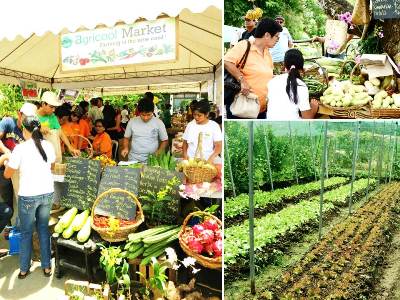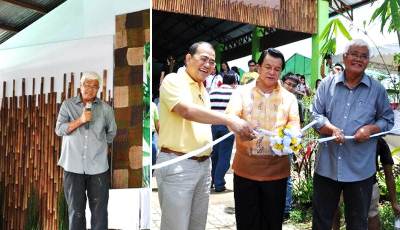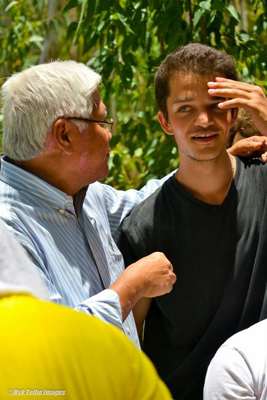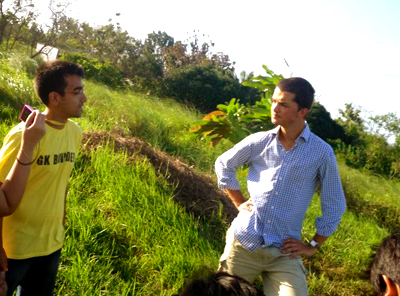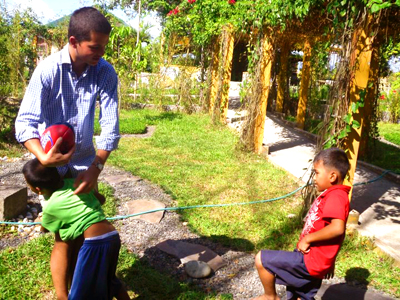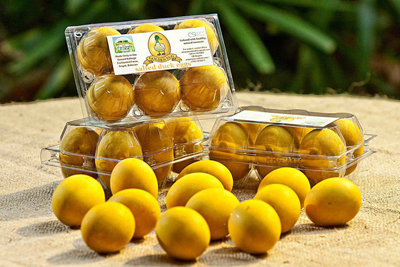‘How crazy idea grew wings, flew out of cage’
by ANTONIO MELOTO
“I value the freedom to serve more than the power to rule.”
Skoll Foundation CEO Sally Osberg cited this line from my book “Builder of Dreams” when she introduced me at the global Social Entrepreneur of the Year awarding ceremonies at England’s Oxford University last March 29.
The quote became a recurring message, and one of the most tweeted, in the weeklong gathering of the Skoll World Forum which brought together nearly a thousand of the world’s poverty-busters and freedom fighters who came to share heroic victories after failing and falling many times, and stubbornly standing up again.
(The Skoll Foundation, the world’s largest foundation for social entrepreneurship, presents the Skoll Awards for Social Entrepreneurship each year to a select few social entrepreneurs who are solving the world’s most pressing problems.)
To the determined and authentic, service love does not easily give up.
Clearly, the desire to serve does more good for the world than the ambition to rule.
In the past decade, the Skoll Foundation has honored ordinary men and women who had the freedom of spirit to fly uncommon ideas for the common good, normal people doing the abnormal because the old normal no longer worked.
This global event has been described as a gathering of small people with big deeds exemplified by this year’s awardees—Landesa, Nidan and Proximity Designs. To be in the company of game-changers and disruptors who are not afraid to turn the world upside down is a big honor for Gawad Kalinga (GK) and for the Philippines.
Jeff Skoll—the founding president of eBay online auction and shopping website who founded the Skoll Foundation in 1999—said it simply at our lunch meeting on the first day: “Just tell your story,” how your crazy idea grew wings and flew out of the cage.
After those hectic days in Oxford, I’m now trying to piece my story about the incredible journey of ordinary dream-builders from the slums of Manila who have found their way to this world stage.
Cash is good but sacrifice is better
The staggering $1-million prize given to Gawad Kalinga—nearly equaling the Nobel prize—that came with global credibility and prestige, validated our focus on vision and value and not on money and power. Quite often, it is the cause that chases after money when one begins with a funding mentality. We chose to start our journey to ease human suffering differently by bleeding for the cause, digging into our own pockets and not giving up when the wells dried up and friends started to abandon us. The sacrifice ultimately bore fruit—2,000 GK villages built and over a million lives transformed, not only of the most marginalized, but also of the volunteers who found redemption and meaning in caring.
When we are not blinded by a desire for money or paralyzed by a lack of it, we learn to use our creativity, raise passion-driven caretakers and volunteers whose nobility cannot be bought and the integrity of the mission is not compromised.
Like Jeff—the producer of such socially relevant films such as “The Inconvenient Truth”, “Contagion” and “The Help”—I am a movie addict, influenced in the causes I champion by unforgettable lines from my favorite films. “Build … and they will come” was a profound message I received from Kevin Costner in “Field of Dreams.” We did … and they came. We built our first communities without a master plan and adequate resources and never stopped trying even when we kept making mistakes until we got it right. Others who knew better or had more resources were scared to do it or simply gave up after a few falls. Up to this day, with all the recognition we have received, we are still a work in progress.
Big dreams for small people
Big money started to chase our cause with big trust in our everyday heroes. The big spirit of our volunteers attracted science and system from universities, corporations and government to come and enhance our delivery, scale and sustainability.
Big business became our friend in development as we created shared value for the poor and those helping them. Doing good made good business sense.
The floodgates of goodness are now wide open and more social entrepreneurs in the Philippines are leaving their comfort zones to give comfort to the suffering.
It is to all our caretakers, cohorts, collaborators and comrades in this peaceful revolution for change that awards like this belong to. We have a long way to go in our audacious dream of helping end poverty for 5 million families in our country by 2024 but an important global recognition like the Skoll award brings us closer to our goal.
Great strength in the weak
At the formal dinner for present and past awardees in a “Harry Potter”-like university hall setting, I also dedicated the award to our bold and nontraditional President, Benigno S. Aquino III, for his efforts to curb poverty in our country with his relentless fight against corruption and his support for social innovators like GK. We have found a kindred spirit in the most powerful man in the Philippines whose strength is in making the weak strong, who will not perpetuate himself in office beyond his term in 2016.
Social enterprises cannot ignore the role of government in development, or take over its role, if they want to make the most impact. They can help in the delivery of services, facilitate partnerships, restore trust and leverage limited government resources with private sector contribution. A challenge that is real for the social entrepreneur is how to resist the temptation of seeking political power when his cause becomes popular.
The situation may be different in other countries where a charismatic social innovator becomes the rallying point for political change. It is a hard choice for a game-changer to make as he risks the credibility of his cause and the trust of his supporters when he plays the tricky power game.
I made mine simple from the start. By being free of a desire for power, I gained the trust of the powerful to serve the weak. I engaged politicians of all parties but stayed clear of partisan interest, refrained from judging their intentions as long as they were willing to accept our path of integrity to create the greater good. So far none of the more than 600 mayors, governors, congressmen and senators we have engaged have tried to corrupt us. Many of them have discovered that doing good to people and the environment is good politics and can help win elections.
One great delight for me at the awarding ceremony was watching Luis Oquinena, my successor as GK executive director, give the acceptance speech. It was a magical moment to witness how a young engineer from my Negros Occidental home province who joined me at the beginning of my journey could speak spontaneously before a global audience of great achievers. His confidence comes from an intelligent heart and strength of character nurtured over the years by hard work and passion for the mission.
It is immensely gratifying for me who started the race to find younger runners with bigger shoes who can take bigger strides toward the finish line, who will use the prize to help the lame walk so they can strive to finish the race themselves. I find it simply liberating to trust the young to shape their future once they’re ready and for me to move on to another innovation space. With Luis running our community-building effort effectively, my focus now is connecting young entrepreneurs from top business and management schools with farmers in our Centre for Social Innovation (CSI) to build our economic platform for countryside development. We have to combine lofty idealism with enlightened capitalism for the brightest and the best in our country to be wealth creators at home rather than job seekers abroad.
That night also belonged to Issa Cuevas-Santos, our director for systems and IT, who joined us in Oxford. Issa, now 33, started with us straight out of college to help set up our network in the countryside, including remote rebel areas. She was was 13 when her father, a prominent doctor in their hometown, was gunned down in front of her by insurgents demanding revolutionary taxes. Restoring the lives of the poor was Issa’s way of healing herself since she realized that it was poverty that killed her father. This wounded healer understands that caring is the best prescription for human suffering.
Many social entrepreneurs come from the ranks of the wounded. They are in this business because they have known the reality of pain. They gain the freedom to serve by planting hope, not hatred, when their passion for change is fueled by love of neighbor, not anger towards another. Hope heals, hatred creates more wounds.
Although she could not be with us being five months pregnant with her fourth child, the Oxford setting made me think of my eldest daughter, Anna, who joined me in my work with gang members when she was in her first year at a Jesuit university. She taught me in our early forays into the slums to see the poor as family, not just an object of charity or dole-outs.
Society created man-made walls between the haves and the have-nots and made our entire nation poor. It was time to break down those walls to liberate not only the downtrodden but my descendants as well. The caring DNA must be passed on to my children if I wanted the world to be better than what it is today.
It was heartening for me to see at the World Forum the CEO of the Skoll Centre for Social Entrepreneurship Pam Hartigan with her son and daughter-in-law and past awardee from the Philippines Cecilia Flores-Oebanda of Visayan Forum, also with her son, dreaming together as a family of a world without dictators, illegal loggers, human traffickers and hungry children.
The world is a hybrid
Anna and her British-born husband Dylan took a rib off Gawad Kalinga and formed Human Nature three years ago, producing high-quality natural personal care products aimed at improving the lives of farmers while protecting the environment through organic farming and creating jobs for GK beneficiaries and many low-income families. They are mentoring budding social entrepreneurs, opening outlets for their products and supporting Gawad Kalinga’s efforts to build the first Enchanted Farm Village University in Angat, Bulacan—with Pilipinas Shell, Hyundai and GK USA chair Tony Olaes and his Korean wife Grace—for bottom-of-the-pyramid wealth creation.
As a social business incubator and a destination for social tourism, this village university has become a popular destination for hundreds of interns from Europe, North America and Asia. It is inspiring to watch our French interns have the time of their life planting bamboo, weaving rattan baskets or building a playground with their adopted local nanay (mother) and tatay (father).
The convergence of rich and poor, white and brown in search of excellence for a better humanity blurs old social and racial lines in our village university of hope.
I guess this is what the Skoll award means to us: We can all dream of a future where everyone is family and the world is finally free to serve without borders, in the way that a newfound brother at Oxford, Larry Brilliant, has helped to make the world smallpox-free. If there is no vaccine to greed, social entrepreneurs will combat the spread of evil by doing more good.
The gateway to Asia
With three of this year’s four winners from Asia, Hans Rosling was right in saying in his engrossing presentation on demographics that this is the dawning of the Asian age. It is coming at a time when there is much to learn from the good things as well as the mistakes of economies that have advanced ahead of us, to anchor our progress on justice and peace, on capitalism with a conscience—avoiding cutthroat competition, unbridled greed and excessive consumerism—to create profit with a big heart for the least and the lost.
Boosted by this award, Proximity Designs will line the road to Burma with springs of living water, Nidan will make the poorest Indian a maharajah in his home and Gawad Kalinga will continue to build heaven in the slums.
The Philippines will be the breeding ground of social entrepreneurs and the home of the free.
“Sweet dreams are made of these,” to borrow a line from singer Annie Lennox who enthralled us at the awards night.
